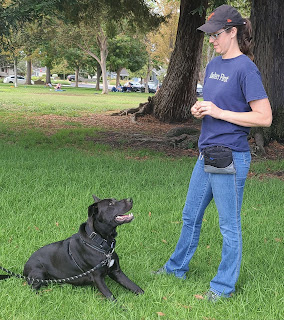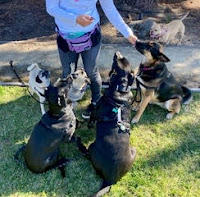You might have been hearing about large dogs, like Mamba, who come to our organization needing care, support, love and, yes, training! Even with sweet temperaments, smarts and immense potential, these beautiful dogs can stay in shelters or foster care longer than other pets. But why? We talked with Kara Fike, CPDT-KA, and Hannah Senadenos, CPDT-KA, owners of Underdog Academy Dog Training to find out.
 |
| Mamba with Hannah is a good boy! |
I understand that when we rescue big dogs, it’s harder to find them forever families. Why is that?
There are a variety of reasons that can contribute to why large dogs tend to have a longer length of stay in shelters and rescues. Any challenge a dog may display can be compounded by size. A 10-pound-dog that pulls on leash or is fearful with new people may be easier to manage than a 75-pound-dog with the same issues.While not always the case, smaller dogs are sometimes thought of as being easier to care for, needing less space, needing less exercise, and challenging behaviors that can be more easily ignored. Housing restrictions can also limit certain large size dogs and breeds which may deter adopters.
Dogs in rescues and shelters do not always have the benefit of coming from circumstances that gave them training, whether that is basic manners, obedience, potty training, etc. Large dogs that may not have this training need more time and commitment to helping them learn.
What are some of the challenges big dogs and their owners face? What do you do to help them?
All dogs face the risk of being misunderstood. Many people don’t understand how dogs communicate or how they learn. We love for owners to educate themselves on basic body language, warning signs of discomfort, and vocalizations to avoid misinterpreting their own dog.
People also have high expectations for how a dog should behave based on their own experiences or what they have seen in movies or tv, and when a dog acts differently, they think their dog is "bad" or "broken". The fact is, a lot of natural dog behaviors are often considered nuisance or deviant behavior which can set dogs up to fail. We task owners with resetting their expectations, being flexible, and finding outlets for their dog to be a dog.
It is easy for a big dogs' physical and mental needs to be underestimated. Most large dogs have a higher need for regular cardio outlets and daily mental engagement in the form of chewing, foraging, problem solving, basic training, and more. Owners should consider their schedule, their goals, their availability and how it will balance with the dog's needs when exploring a big dog adoption. Truly the best step any person can take to make large dog ownership successful is preparation and considerate matchmaking before bringing a dog into the home.

|
| Phantom shakes Kara's paw. |
We formed Underdog Academy Dog Training to meet the increasing need of positive reinforcement training for common yet challenging dog behaviors. We wanted to get ahead of the issues that often land dogs in shelters. Through our local shelter-rescue connections and a wonderful trainer named Jessica Char (Canine Engineering), we were referred to SVPP to help with in-person training. We not only provide behavioral advice to the rescue group, we also meet with foster parents, potential adopters, and recent adopters to help guide them on basic training as well as addressing behavioral concerns. We’ve worked with many SVPP dogs, including Mamba. He is an active, smart, exuberant, and super affectionate dog. He needs time to warm up to new people as he can be nervous so we have worked with SVPP to build his confidence and put together a game plan for how to best introduce him so he can make new friends.

